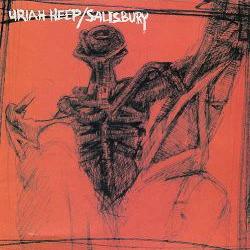Top Qs
Timeline
Chat
Perspective
Salisbury (album)
1971 studio album by Uriah Heep From Wikipedia, the free encyclopedia
Remove ads
Salisbury is the second studio album by English rock band Uriah Heep, released in January 1971 by Vertigo Records in the UK and Mercury Records in the US. It was produced by Gerry Bron.
Unlike their first album, songwriting credits for fully half of the record were attributed to Ken Hensley alone, as opposed to the debut's collaborative partnership of frontman David Byron and guitarist Mick Box. Soon after the release, drummer Keith Baker left the band,[6] replaced by Ian Clark (from another Vertigo band, Cressida). With Clark, the band embarked on their first US tour, supporting Three Dog Night and Steppenwolf.[7]
Remove ads
Musical style
Salisbury is skewed toward the progressive rock genre, with its 16-minute title track featuring a 24-piece orchestra[3] and was also significant for Hensley's instant rise to a position as main composer of the group's music.
Cover art
The front cover of the album depicted a British Chieftain tank, which connects to the title, as Salisbury Plain in Wiltshire, England, is a military training area. The original LP release was a gatefold sleeve, with a black-and-white image of the underside of a Chieftain tank on the inside with the turret facing the rear, over which were printed Hensley's comments on each track. Later reissues would be in a single sleeve. The American release on Mercury Records featured a different cover image (an abstract illustration by an unidentified artist of a human figure that appeared to have portions of its skin removed), as did the original Canadian pressings. Subsequent Canadian pressings used the UK artwork.
Remove ads
Release
The album was reissued by Bronze Records later in 1971 after the band signed to that label for their third album.[7] Salisbury was remastered and reissued by Castle Communications in 1996 with two bonus tracks, and again in 2003 in an expanded deluxe edition. In 2016, Sanctuary Records released a two-disc deluxe edition.
Reception
According to AllMusic reviewer, the album perfected Uriah Heep's "blend of heavy metal power and prog rock complexity" and "is too unfocused for the casual listener but offers enough solid songs for the Uriah Heep completist."[3] Canadian journalist Martin Popoff described the album as "a dark downer" and "a failed experiment", imputing the cause of the slip to the "prog rock nightmare" of the title track and to "the hatchet production job".[8] William Pinfold of Record Collector, reviewing the 2016 expanded re-issue, considered Salisbury "a collection notable for tightness, precision and a confident breadth of talent", and praised the band for the album's variety.[9]
One of the album's tracks, "Lady in Black", described as "a stylishly arranged tune that builds from a folk-styled acoustic tune into a throbbing rocker full of ghostly harmonies and crunching guitar riffs",[3] became a hit in Germany upon its re-release in 1977 (earning the band the Radio Luxemburg Lion award).
Remove ads
Track listings
UK Release
US Release
Remove ads
Personnel
- Uriah Heep
- David Byron – lead vocals (except "Lady in Black" and "High Priestess")
- Mick Box – lead guitar, acoustic guitar, backing vocals
- Ken Hensley – organ, piano, slide guitar, acoustic guitar, harpsichord, vibraphone, backing vocals, lead vocals on "Lady in Black" and "High Priestess"
- Paul Newton – bass guitar, backing vocals
- Keith Baker – drums
- Additional personnel
- John Fiddy – brass and woodwind arrangement on "Salisbury"
- Production
- Gerry Bron – producer
- Peter Gallen – engineer, mixing
- Tom Coyne – mastering
Remove ads
Charts
Remove ads
References
Wikiwand - on
Seamless Wikipedia browsing. On steroids.
Remove ads


